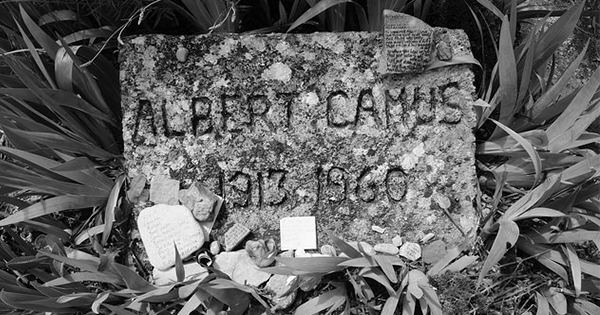
The tombstones of Jean-Paul Sartre and Simone de Beauvoir—despite their bohemian airs—occupy elegant, expensive lots in Paris’s Montparnasse Cemetery. Both writers’ monuments are marked and easy to find, contrasting sharply with the final resting place of their chief rival, Albert Camus, whose bare stone slab in Provence is set upon a tangle of desert plants sprouting from the limestone gravel.
It had long been a goal of mine to see Camus’ grave in person. My wife and I and some friends, in the south of France for a late-summer wedding, woke up early Sunday morning and made the pilgrimage to the small cemetery just outside the postcard village of Lourmarin. We passed the site several times before we even noticed it. The size of a chessboard, it is almost inarticulate, announcing nothing but the great man’s name and the dates of his birth and death, 1913–1960, an impossibly brief period that at this point in my life provokes serious contemplation. The tombstone is crumbling, its inscription so eroded it resembles a child’s uneven scrawl. There lay the author of—by age 30—both The Myth of Sisyphus and The Stranger, a destitute scholarship boy from French Algeria who’d come to the capital and made good a million times over. The second youngest recipient of the Nobel, Camus had bought a home in Lourmarin with his prize money. Whereas he had described gloomy Paris in his notebooks as a “stage set,” he could never cease to feel the tug of the simple pleasures of his youth: the sea, rock, sun, salt, and sand along the Mediterranean shores of Africa. Provence was an excellent compromise.
I have never seen a grave (not even Napoleon’s submerged coffin, which forces an observer to bow in deference when looking upon it) more befitting of the person it contains: one final, unanswerable rebuke to the arrogance of man, that absurd creature, whose only meaning can ever be to thrill to life in spite of inescapable death.

